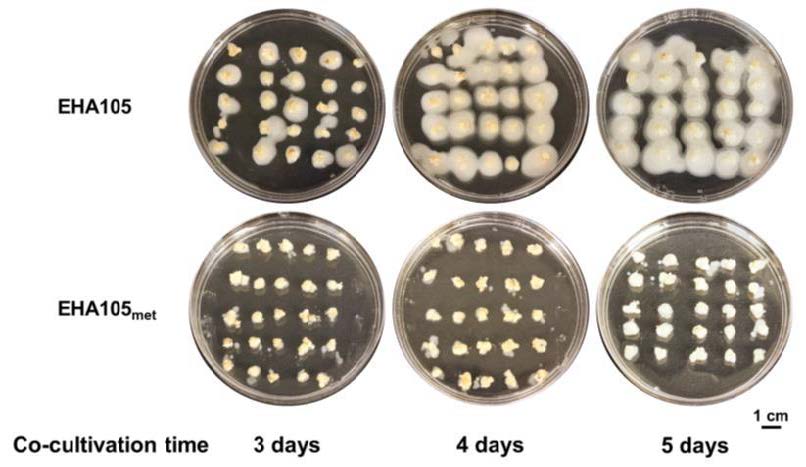10/14/2022
Engineered Auxotrophic Agrobacterium Strains Improve Plant Transformation
Bacterial overgrowth controlled without antibiotics

Agrobacterium tumefaciens growth in co-cultivation with switchgrass tissue. The top row shows wild type strain EHA105 overgrowing on plant tissue. The bottom row shows that the methionine auxotroph of the same strain (EHA105met) did not overgrow, yet supported efficient transformation of the plant tissue. Plant tissue may produce enough methionine to support limited growth of the bacteria.
[Reprinted under a Creative Commons license (CC BY) from Prías-Blanco, M., et al. 2022. DOI:10.1007/s11248-022-00328-4]
The Science
Auxotrophic strains of Agrobacterium tumefaciens can contribute to the development of more efficient plant transformation systems, especially for crops historically considered recalcitrant. A. tumefaciens has revolutionized plant science over the past decades due to its ability to transfer DNA into the cells of a wide range of plant species.
Successful transformation depends on the ability to control A. tumefaciens strains using antibiotics to prevent the bacteria from overgrowing explants in tissue culture. However, some antibiotics can affect tissue growth.
To develop more effective ways to control bacterial growth during plant transformation, researchers with the Center for Bioenergy Innovation engineered two A. tumefaciens strains auxotrophic for methionine (EHA105met and LBA4404met) as a counterselective agent alternative to antibiotics to cure plants of the bacterium.
The Impact
Engineered auxotrophic A. tumefaciens strains prevented bacterial overgrowth on plants without the need for antibiotics. Furthermore, the engineered strains enabled biological containment of bacteria carrying transgenes.
Summary
Switchgrass and rice transformation were chosen to assess the performance of the auxotrophic A. tumefaciens strains, engineered via homologous recombination. Use of the strains minimized the need for antibiotics during transformation. Auxotrophy had no effect on the number of transfer DNA copies delivered by any of the strains evaluated, suggesting that the engineered strains exhibited the same transformation frequency as the parental strains.
Principal Investigator
Wayne Parrott
University of Georgia, Athens
wparrott@uga.edu
BER Program Manager
Shing Kwok
U.S. Department of Energy, Biological and Environmental Research (SC-33)
Biological Systems Science Division
shing.kwok@science.doe.gov
Funding
Funding was provided by The Center for Bioenergy Innovation, a U.S. Department of Energy Research Center supported by the Biological and Environmental Research program in the DOE Office of Science.
References
Prías-Blanco, M., et al. 2022. “An Agrobacterium Strain Auxotrophic for Methionine is Useful for Switchgrass Transformation.” Transgenic Research. 31, 661-676. DOI:10.1007/s11248-022-00328-4.
